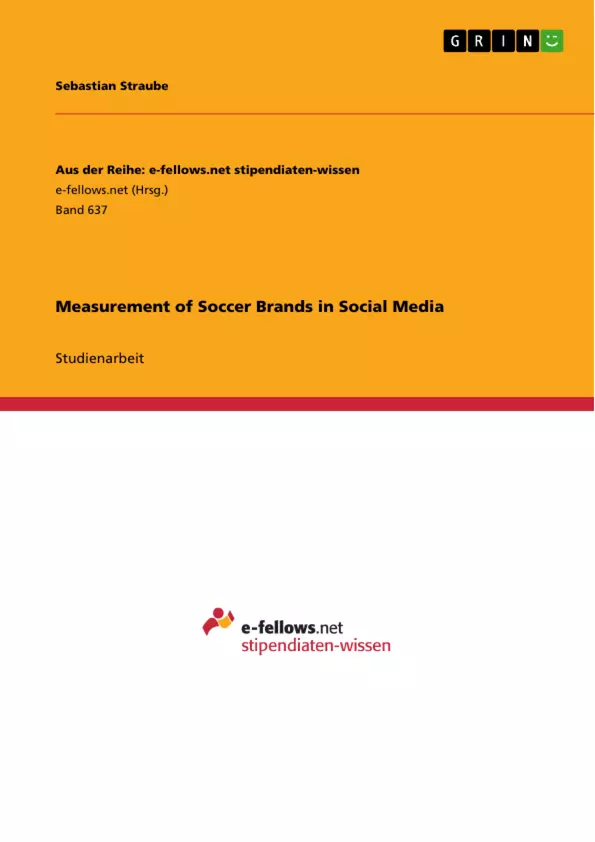In the course of the rising importance of the economic competitive position of professional soccer clubs and as a consequence thereof the spreading of entrepreneurial structures makes the buildup and management of professional team brands inevitable. A professional and customer-oriented brand management is essential for the long-term success of a brand. "While (athletic) success may be fleeting, a focus on commitment to customers is not". The brand facilitates economic success independently of athletic success.
In just a few years, social media, especially social networking sites, have become extremely popular: As of January 2009, Facebook registered more than 175 million active users that is over twice the population of Germany and the average amount of time spent on social networks increased by 82%. Companies have never had such an opportunity to interact with millions of customers at relatively low prices. Thus it is inevitable for professional soccer teams to build strong brands in the social media environment. Social media employs mobile and web-based technologies to construct highly interactive platforms through which individuals and communities share, co-create, and discuss user-generated content. With this rise in social media the power has been shifted from firms towards the individuals that create, share, and consume Facebook entries, blogs, etc. Communication about brands occurs, with or without the permission of firms, which is another reason to join the discussions actively.
This paper addresses the problem of how professional soccer teams can build strong brands, first offline and then specified for brand fan pages of social networking sites and how they can measure the success of their brand building actions.
The flow of this paper is as follows: first, Keller's model of customer-based brand equity is presented. That initial section is followed by adapting Keller's approach to soccer brands and the paper concludes with a specification of that approach for soccer brands in the social media environment.
Inhaltsverzeichnis
- 1. Introduction
- 2. Brand measurement
- 2.1 Defining customer-based brand equity
- 2.2 Building customer-based brand equity
- 2.3 Measuring customer-based brand equity
- 3. Measurement of soccer brands
- 3.1 Building customer-based brand equity
- 3.2 Measuring customer-based brand equity
- 3.3 Marketing implications
- 4. Measurement of soccer brands in social media
- 4.1 Building customer-based brand equity
- 4.2 Measuring customer-based brand equity
- 5. Conclusion
Zielsetzung und Themenschwerpunkte
Diese Seminararbeit befasst sich mit der Messung von Fußballmarken in sozialen Medien. Sie untersucht, wie professionelle Fußballteams starke Marken aufbauen und messen können, insbesondere im Kontext von Social-Networking-Plattformen. Die Arbeit analysiert die Relevanz von Social Media im Bereich des Markenmanagements und beleuchtet die Möglichkeiten, die diese Plattform für den Aufbau von Markenbekanntheit und -loyalität bietet.
- Kunde-basierte Markenkapital
- Messung von Markenkapital im Fußball
- Die Bedeutung von Social Media im Markenmanagement
- Aufbau von Marken in sozialen Medien
- Messung des Erfolgs von Markenaktivitäten in sozialen Medien
Zusammenfassung der Kapitel
Kapitel 1: Introduction
Dieses Kapitel führt in die Thematik des Markenmanagements im professionellen Fußball ein. Es unterstreicht die Bedeutung des Markenaufbaus und -managements für den langfristigen Erfolg von Fußballvereinen, insbesondere angesichts der wachsenden wirtschaftlichen Bedeutung des Sports.
Kapitel 2: Brand measurement
Dieses Kapitel definiert das Konzept des kundenbasierten Markenkapitals und beschreibt die verschiedenen Dimensionen, die zur Bildung von Markenkapital beitragen. Es geht auf die Methoden ein, mit denen das Markenkapital gemessen werden kann, um den Erfolg von Markenaktivitäten zu bewerten.
Kapitel 3: Measurement of soccer brands
Dieses Kapitel konzentriert sich auf die spezifischen Herausforderungen und Möglichkeiten der Markenmessung im Fußball. Es untersucht, wie kundenbasiertes Markenkapital im Fußball aufgebaut und gemessen werden kann. Darüber hinaus werden die Implikationen für das Marketing von Fußballvereinen diskutiert.
Kapitel 4: Measurement of soccer brands in social media
Dieses Kapitel untersucht die Bedeutung von sozialen Medien für den Aufbau und die Messung von Fußballmarken. Es analysiert, wie Social-Networking-Plattformen genutzt werden können, um kundenbasiertes Markenkapital zu entwickeln und zu messen. Dieses Kapitel bietet wertvolle Erkenntnisse darüber, wie Fußballvereine Social Media effektiv für ihre Markenstrategien nutzen können.
Schlüsselwörter
Die wichtigsten Schlüsselwörter und Fokusbereiche dieser Arbeit sind: Kunde-basiertes Markenkapital, Fußballmarken, Markenmanagement, Social Media, Social-Networking-Plattformen, Markenbekanntheit, Markenloyalität, Messung von Markenkapital, Markenaktivitäten, Marketingimplikationen.
Häufig gestellte Fragen zur Messung von Fußballmarken
Warum ist Markenmanagement für Fußballvereine heute so wichtig?
Da sportlicher Erfolg oft schwankend und schwer planbar ist, ermöglicht eine starke Marke wirtschaftliche Stabilität unabhängig von den Ergebnissen auf dem Platz. Professionelles Branding bindet Fans langfristig und sichert Sponsoreneinnahmen.
Was ist kundenbasiertes Markenkapital (Brand Equity)?
Es beschreibt den Wert einer Marke aus Sicht des Konsumenten (Fans). Dieser Wert entsteht durch Markenbekanntheit und starke, positive Assoziationen, die zu einer höheren Loyalität und Zahlungsbereitschaft führen.
Welche Rolle spielen soziale Medien für Fußballmarken?
Social Media ermöglicht die direkte Interaktion mit Millionen von Fans weltweit bei relativ geringen Kosten. Vereine können hier nutzergenerierte Inhalte fördern, Diskussionen moderieren und die Markenbindung durch exklusive Einblicke stärken.
Wie kann der Erfolg von Markenaktivitäten online gemessen werden?
Der Erfolg lässt sich durch Metriken wie Engagement-Raten (Likes, Shares, Kommentare), das Wachstum der Follower-Zahlen und die Analyse der Stimmung (Sentiment Analysis) in den Kommentaren bestimmen.
Was bedeutet die Machtverschiebung durch Social Media?
Die Macht hat sich von den Vereinen hin zu den Individuen verschoben, die Inhalte erstellen und teilen. Kommunikation über die Marke findet heute permanent statt, weshalb Vereine aktiv an diesen Diskussionen teilnehmen müssen.
Wie baut man eine starke Fußballmarke in sozialen Netzwerken auf?
Durch konsistente Kommunikation, die Einbindung der Fans in Entscheidungsprozesse (Co-Creation) und das Schaffen von interaktiven Plattformen, die über die reine Information hinausgehen und Emotionen wecken.
- Quote paper
- Sebastian Straube (Author), 2013, Measurement of Soccer Brands in Social Media, Munich, GRIN Verlag, https://www.grin.com/document/209711



